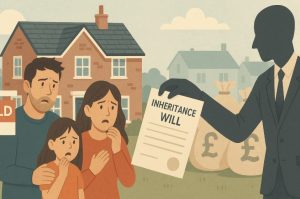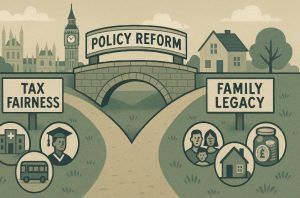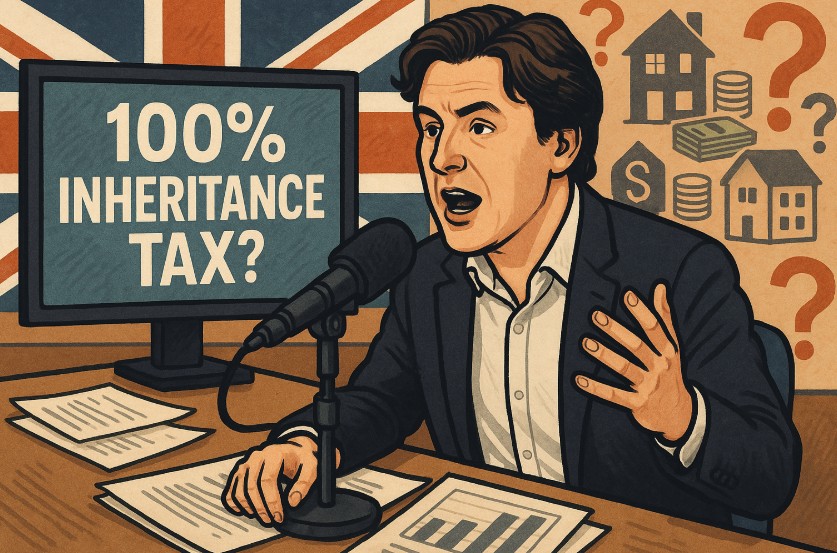The debate over inheritance tax in the UK has intensified following comments by journalist Lewis Goodall, who suggested the rate should be raised to 100%.
His remarks, delivered during a recent LBC broadcast, challenge long-standing views on wealth, entitlement, and fairness.
By questioning the right to inherited assets, Goodall has sparked a national conversation on economic equality, family legacy, and the role of government in wealth redistribution. This article explores the implications of his proposal and the reactions it has provoked.
Who Is Lewis Goodall and What Did He Say About Inheritance Tax?

Lewis Goodall is a well-known British journalist and political commentator, currently co-hosting The News Agents podcast and formerly associated with LBC and the BBC.
He recently reignited the national debate on wealth and taxation by making a provocative statement on his LBC radio show.
Goodall proposed that inheritance tax should be raised to 100%, asserting that wealth should be earned through labour, not passed down via family inheritance.
He referred to the UK’s current economic structure as an “aristocracy of wealth,” stating that inherited assets give some people a financial advantage that isn’t available to others.
According to Goodall, inherited wealth undermines the value of work and promotes economic inequality.
His argument focused on:
- Encouraging a society where income is earned, not gifted
- Reducing reliance on inherited assets
- Funding public services by redistributing inherited wealth
Goodall also claimed that abolishing inherited wealth could allow for reduced income taxes, further promoting a culture of work rather than entitlement.
Why Is There a Growing Debate Over Inheritance Tax in the UK?
The conversation around inheritance tax (IHT) in the UK is gaining renewed attention due to shifting economic conditions, growing inequality, and provocative public commentary such as that made by Lewis Goodall.
The tax, which affects estates valued above a certain threshold, has become a lightning rod for wider discussions about fairness, opportunity, and generational privilege.
Rising Property Prices Are Pulling More Families Into the Tax Net
One of the core reasons for the growing debate is that more families are being pulled into the inheritance tax bracket, not because they are wealthy, but because of property price inflation. In regions such as London and the South East, it is increasingly common for modest family homes to exceed the £325,000 inheritance tax threshold.
As a result:
- Middle-income households now face tax burdens once reserved for the wealthy
- Property-rich but cash-poor families are hit hardest
- Calls for index-linking or raising the threshold have intensified
This shift has created resentment among the public, who feel that IHT is no longer a tax on the rich but a penalty on hard-working families.
Intergenerational Wealth Gaps Are Fueling Social Tensions
Economic disparity between generations has widened over the past two decades. Older generations benefited from affordable housing, generous pension schemes, and steady wage growth, while younger people face rising living costs, student debt, and job insecurity.
Inheritance has become one of the only realistic ways younger generations can afford home ownership or financial security, making the prospect of losing inherited assets more controversial than ever.
Key issues driving this tension include:
- The increasing reliance on inheritance for social mobility
- Frustration over being “locked out” of wealth accumulation
- Criticism of a system that preserves privilege based on birth
Public Opinion Is Split on Fairness and Responsibility
Surveys show the UK public remains deeply divided over whether inheritance tax is fair. Some view it as a necessary tool to reduce wealth inequality, while others see it as a punitive measure that penalises success and family responsibility.
There is also a psychological component: the idea that people should be free to leave behind a legacy to their children is deeply ingrained in many cultural and familial values. On the other hand, critics of low or no inheritance tax see it as enabling a “lottery of birth.”
Politicians Are Using the Issue as a Political Battleground
Both major political parties have taken positions on inheritance tax, using it as a tool to signal their broader economic philosophies. The Labour Party has proposed measured reforms aimed at closing loopholes and taxing high-value estates more effectively. Meanwhile, some Conservative MPs have called for abolishing inheritance tax altogether or raising the threshold substantially.
Political factors driving the debate include:
- The upcoming general election and party manifestos
- Pressure from constituents in key voter demographics
- Media coverage framing IHT as either “unfair” or “necessary”
Social Media Is Amplifying the Divide
Platforms like X (formerly Twitter), Facebook, and TikTok have given rise to a new generation of financial commentators and politically engaged users who often bring nuance or polarisation—to the discussion.
Social media trends have:
- Brought niche economic ideas like 100% inheritance tax into the mainstream
- Allowed users to express outrage or support instantly
- Created viral moments that pressure politicians to respond
In the case of Lewis Goodall, his comments sparked thousands of responses, turning what might have been a fringe view into a subject of national conversation.
What Would a 100% Inheritance Tax Mean for British Families?

Introducing a 100% inheritance tax would mean that individuals could no longer leave their estate to family members or beneficiaries.
Instead, the state would claim the entire estate upon death, regardless of its size or composition. This would be a fundamental shift in how wealth is treated in the UK.
Potential effects on families might include:
- Elimination of financial legacies passed between generations
- Reduced motivation for long-term saving or investing
- Major impact on family-run businesses and farms
- Pressure to spend or donate wealth before death
Supporters believe such a policy would equalise opportunities and remove the entrenched advantage of being born into wealth. However, critics argue that it penalises responsible financial planning and erodes the family’s right to provide for future generations.
Is Inherited Wealth an Unfair Advantage or a Family Right?
This issue draws a sharp line between differing political and moral philosophies. One side argues that inherited wealth creates a “head start” for some, reinforcing existing class divisions and making social mobility harder. From this perspective, high inheritance tax is a tool to dismantle privilege and reward merit.
Others believe that accumulated wealth represents a lifetime of hard work, sacrifice, and responsible living, and should be passed on as a legacy.
Arguments supporting each side:
| Viewpoint | Key Beliefs |
| Inheritance as unfair advantage | Reinforces inequality, reduces motivation, lacks merit |
| Inheritance as family right | Respects family autonomy, honours hard work, preserves legacy |
The framing of the debate often depends on one’s political views, financial background, and generational identity.
Could a Higher Inheritance Tax Help Fix Economic Inequality?

Supporters of inheritance tax reform argue that wealth redistribution is essential to reduce economic disparity.
By heavily taxing inherited estates, the government could potentially increase funding for underfunded public services while lowering taxes on earned income.
Goodall suggested that the tax revenue generated from a higher inheritance tax could help “level the playing field.” His belief is rooted in the principle that taxing unearned income can make society fairer and more meritocratic.
Benefits cited by proponents include:
- Boosting funding for education, healthcare, and social housing
- Reducing income tax for lower- and middle-income workers
- Increasing social mobility across all economic classes
However, any significant increase in inheritance tax would need to be carefully designed to avoid punishing families with moderate wealth, such as those with property assets in high-cost regions.
How Has the Public Reacted to Goodall’s 100% Tax Proposal?
The public response was swift and polarised. Goodall’s comments were widely discussed on social media, where critics labelled the idea “insane,” “elitist,” and “detached from reality.” Many users highlighted the emotional and practical implications of losing the right to provide for one’s family after death.
Common objections shared on social media included:
- The belief that parents should have full control over their wealth
- Concerns about the government’s ability to manage the funds responsibly
- Fears that such a policy would encourage capital flight
Yet, there were voices in support of the broader message. A portion of the public resonated with the critique of privilege and agreed that inherited wealth should not entrench inequality.
Are There Realistic Alternatives to 100% Inheritance Tax?
Rather than pursuing a full-scale abolition of inheritance, many policy experts recommend a more measured reform of the current system. This includes expanding the taxable base, closing loopholes, and adjusting rates for ultra-wealthy estates.
Key changes proposed in the Autumn 2024 Budget include:
| Reform Area | Description |
| Digital reporting | Simplifying and modernising inheritance tax submissions |
| Tax on farmland and estates | A new 20% tax on farms and estate buildings over £1 million |
| Non-UK domicile changes | Stricter rules for individuals benefiting from offshore status |
These proposals aim to make the tax system more efficient and equitable without entirely removing the ability to pass wealth to one’s children.
Could High Inheritance Tax Trigger a Wealth Exodus?
Economists have warned that extreme tax policies could drive wealthy individuals to relocate their assets or residency to countries with more favourable tax regimes. The UK already faces competition from countries like the United States, Switzerland, and Singapore, where inheritance taxes are lower or non-existent.
Potential consequences of a wealth exodus:
- Decreased domestic investment
- Lower philanthropic contributions
- Reduced availability of private capital for startups and charities
If large-scale emigration of capital were to occur, the long-term impact could be a decline in economic dynamism and tax revenues. For this reason, most tax policy recommendations include limits or thresholds that target ultra-high-net-worth individuals without affecting middle-income families.
What Are the Legal and Financial Loopholes in Inheritance Tax?
Inheritance tax can often be legally avoided or significantly reduced by utilising a variety of reliefs and planning mechanisms. These options tend to be most accessible to wealthier individuals who can afford professional financial advice.
Common strategies include:
- Lifetime gifting of assets at least 7 years before death
- Placing assets into trusts for children and grandchildren
- Purchasing life insurance policies to cover IHT liabilities
- Using business property and agricultural reliefs
While legal, these methods highlight the inequality of access to tax optimisation tools. Critics argue that these loopholes defeat the purpose of the tax itself, enabling the wealthy to preserve their assets while ordinary families pay a larger share.
Is There a Middle Ground Between Tax Fairness and Family Legacy?

Balancing the principles of tax fairness and personal liberty is one of the most difficult challenges in modern economic policy. There is growing consensus that inheritance tax reform is necessary, but few support a total abolition or 100% rate.
Some potential middle-ground approaches include:
- A tiered tax structure where larger estates are taxed more heavily
- Exemptions for small family-owned businesses and primary homes
- Lifetime inheritance caps per beneficiary
- Introduction of an inheritance receipt tax (taxing the recipient, not the estate)
Such reforms would aim to preserve the ability of families to pass on a reasonable level of wealth while targeting tax efforts on the wealthiest estates.
Conclusion
Lewis Goodall’s comments on inheritance tax have ignited a fierce public debate about wealth, fairness, and the role of government. Whether or not a 100% inheritance tax is ever implemented, the discussion raises vital questions about economic policy in the UK.
As the country grapples with rising inequality and generational divides, this debate is far from over. The balance between rewarding hard work and preventing entrenched privilege will remain central to Britain’s economic and political future.
FAQs About Lewis Goodall and the Inheritance Tax Controversy
What did Lewis Goodall actually propose about inheritance tax?
He suggested, somewhat provocatively, that the inheritance tax rate could be 100% to discourage unearned wealth and promote meritocracy.
Why is inheritance tax controversial in the UK?
It’s seen as both a tool for reducing inequality and as a punitive measure that penalises families trying to leave a legacy.
Is a 100% inheritance tax legally possible in the UK?
Yes, but it would require major legislative changes and is unlikely due to political and public resistance.
How much revenue does inheritance tax generate for the UK government?
Inheritance tax generates around £6 billion annually, a relatively small portion of the UK’s total tax income.
Do any countries have a 100% inheritance tax?
No country currently imposes a 100% inheritance tax, though some have high rates or strict gift/estate taxes.
Can families avoid inheritance tax legally?
Yes, through gifts, trusts, exemptions, and tax planning strategies, families can often reduce their liability significantly.
What alternatives to inheritance tax have been proposed?
Alternatives include wealth taxes, estate duty caps, lifetime gifting rules, and progressive tax rates based on estate size.








